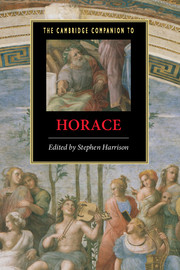Book contents
- Frontmatter
- Introduction
- Part 1: Orientations
- 1 Horace: life and chronology
- 2 Horatian self-representations
- 3 Horace and archaic Greek poetry
- 4 Horace and Hellenistic poetry
- 5 Horace and Roman literary history
- 6 Horace and Augustus
- Part 2: Poetic Genres
- Part 3: Poetic Themes
- Part 4: Receptions
- Dateline of works and major political events
- Works cited
- Index
2 - Horatian self-representations
from Part 1: - Orientations
Published online by Cambridge University Press: 28 May 2007
- Frontmatter
- Introduction
- Part 1: Orientations
- 1 Horace: life and chronology
- 2 Horatian self-representations
- 3 Horace and archaic Greek poetry
- 4 Horace and Hellenistic poetry
- 5 Horace and Roman literary history
- 6 Horace and Augustus
- Part 2: Poetic Genres
- Part 3: Poetic Themes
- Part 4: Receptions
- Dateline of works and major political events
- Works cited
- Index
Summary
The first person is prominent in all of Horace’s work: ego and its oblique cases occur some 460 times in the 7,795 lines of his extant poetry. Indeed, the different poetic genres which constitute his output all seem to have been chosen in part because of the primacy of the poet’s voice: Lucilian sermo with its strong 'autobiographical' element, Archilochean iambus with its 'personal' invective, Lesbian 'monodic' lyric with its prominent 'I', and epistolary sermo with its inevitably central letter-writer, further layered in the Ars Poetica with the didactic voice of the instructor. In what follows I want to consider some aspects of the poet’s self-representation in Horace’s work, in particular the deliberate occlusion in his poetic texts of some of the most important events in his biographical life and his sometimes self-deprecating presentation of his poetic status.
The protected poet
Apart from the brief information about his schooling (Satires 1.6.71–88, Epistles 2.1.69–71), we hear little of the young Horace apart from one memorable anecdote at Odes 3.4.9–20:
Me fabulosae Volture in Apulo
nutricis extra limina Pulliae
ludo fatigatumque somno
fronde noua puerum palumbes
texere, mirum quod foret omnibus
quicumque celsae nidum Aceruntiae
saltusque Bantinos et aruum
pingue tenent humilis Forenti,
ut tuto ab atris corpore uiperis
dormirem et ursis, ut premerer sacra
lauroque conlataque myrto,
non sine dis animosus infans.
- Type
- Chapter
- Information
- The Cambridge Companion to Horace , pp. 22 - 35Publisher: Cambridge University PressPrint publication year: 2007
- 8
- Cited by

